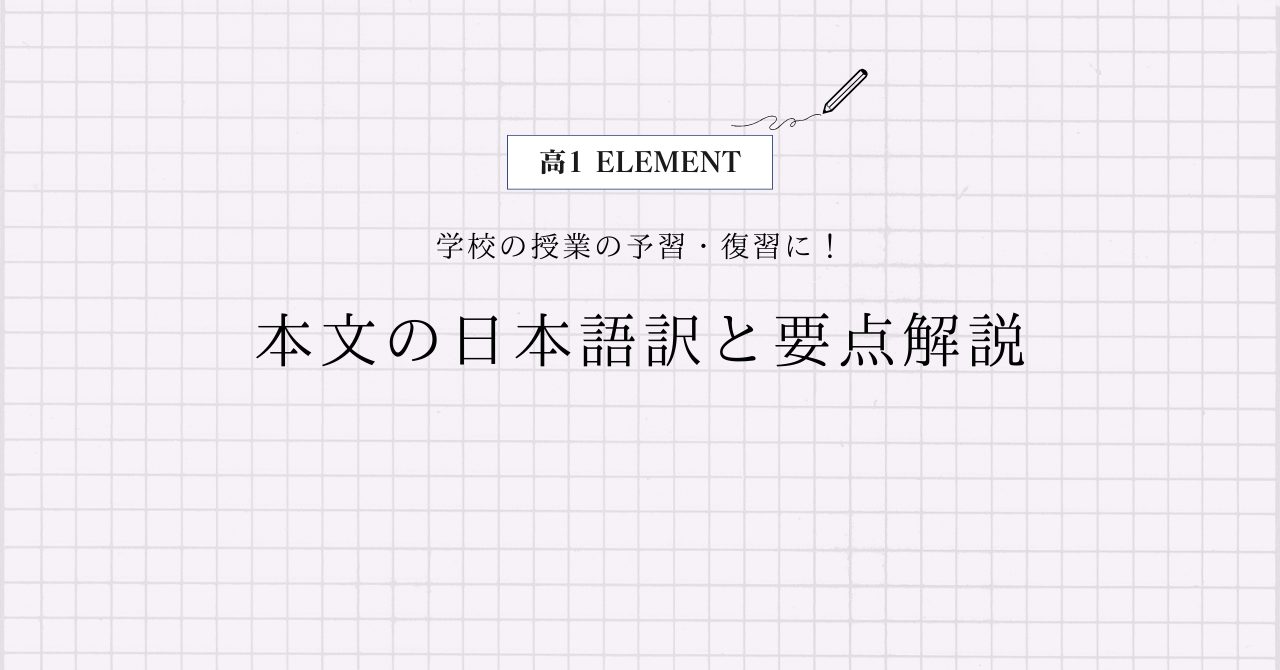三省堂 高1ELEMENT Lesson2 Section3の本文の日本語訳と重要箇所の解説です。
Lesson2-1, 2-2, 2-4の解説はこちらからご覧ください。
>高1ELEMENT Lesson2 Section1 本文和訳
>高1ELEMENT Lesson2 Section2 本文和訳
>高1ELEMENT Lesson2 Section4 本文和訳
- ELEMENT Lesson2 Section3 本文と日本語訳
- ELEMENT Lesson2 Section3 重要事項の解説
- One day, Christian found a belt in the house and picked it up in his teeth.
- Ace tried to take the belt away from him, but for the first time he angrily showed his sharp teeth.
- Ace was shocked, and that reminded him that Christian was a wild animal.
- Since the two men began to worry about Christian, one of their friends advised them to talk to George, an expert on lions in Kenya.
- George said that Christian should join other lions in the wild.
- John and Ace knew that a life in the wild was best for Christian, so they finally agreed with George.
- In 1970, the two men went to Kenya to set Christian free.
- They asked George to train Christian to live in the wild.
- Christian, then, met his new lion friends and learned their ways of living.
- Their last day arrived quickly.
- John and Ace spent one last fun day with Christian.
- The next morning they left early without saying goodbye.
- ELEMENT Lesson2 Section3 まとめ
ELEMENT Lesson2 Section3 本文と日本語訳
One day, Christian found a belt in the house and picked it up in his teeth.
「ある日、クリスチャンは家でベルトを見つけ、それを歯で取りました。」
Ace tried to take the belt away from him, but for the first time he angrily showed his sharp teeth.
「エースは彼からベルトを取ろうとしましたが、初めて彼は怒って鋭い歯を見せました。」
Ace was shocked, and that reminded him that Christian was a wild animal.
「エースはショックを受け、そしてそのことは、クリスチャンが野生の動物なのだということを思い出させました。」
Since the two men began to worry about Christian, one of their friends advised them to talk to George, an expert on lions in Kenya.
「彼らはクリスチャンのことを心配し始めたので、彼らの友達の1人が、ケニアにいるライオンの専門家であるジョージと話してみるようアドバイスしてくれました。」
George said that Christian should join other lions in the wild.
「ジョージは、クリスチャンは他の野生のライオンのもとに加わるべきだと言いました。」
John and Ace knew that a life in the wild was best for Christian, so they finally agreed with George.
「ジョンとエースは、野生での生活がクリスチャンには一番良いと分かったので、彼らはついにジョージに同意しました。」
In 1970, the two men went to Kenya to set Christian free.
「1970年、彼らはクリスチャンを自由にするためにケニアに行きました。」
They asked George to train Christian to live in the wild.
「彼らはジョージに、野生で生きていくためにクリスチャンをしつけるよう頼みました。」
Christian, then, met his new lion friends and learned their ways of living.
「クリスチャンはそれから、新しいライオンの友達に会い、生き方を学びました。」
Their last day arrived quickly.
「彼らの最後の日はすぐにやってきました。」
John and Ace spent one last fun day with Christian.
「ジョンとエースは最後の楽しい1日をクリスチャンと一緒に過ごしました。」
The next morning they left early without saying goodbye.
「翌朝、彼らは別れを告げずに早々に去りました。」

ELEMENT Lesson2 Section3 重要事項の解説
One day, Christian found a belt in the house and picked it up in his teeth.
“one day”は「ある日」という表現ですね。
“found”は“find(を見つける)”の過去形で、“belt”は「ベルト」、“teeth”は“tooth(歯)”という名詞の複数形になります。
“pick up~”は「~を取り上げる、拾い上げる」といった表現で、今回のように代名詞とセットの時は、”pick”と”up”の間に代名詞を入れてあげます。
Ace tried to take the belt away from him, but for the first time he angrily showed his sharp teeth.
“try to 動詞の原形”は「~しようとする」という意味で,これから挑戦するという未来の内容か,挑戦してみたけどダメだったというようなニュアンスで使われることが多いです。難しいといった意味合いが含まれるということですね。
“take A away from B”は「AをBから奪う」といった表現になります。
“for the first time”は「初めて」という表現で、“angrily”は「怒って」という副詞ですね。
“show”は「を見せる、示す」という動詞で、“sharp”は「鋭い」という形容詞になります。
Ace was shocked, and that reminded him that Christian was a wild animal.
“shock”は「にショックを与える、驚かせる」といった動詞で、ここでは「受動態」になっています。
“that”は直前の文全体を指していますね。
“remind”は「(人)に思い出させる」という動詞で、“remind 人 that~”で「人にthat以下の内容を思い出させる」となります。
“wild”は「野生の」という形容詞です。
Since the two men began to worry about Christian, one of their friends advised them to talk to George, an expert on lions in Kenya.
この“since”は「~だから」という理由を表す接続詞です。“because”や“as”も同じ意味になります。
“men”は“man(男性)”の複数形ですね。今回は「彼ら」と訳しました。
“began”は“begin(を始める)”の過去形、“worry about~”は「~を心配する」という意味で、ここでは「不定詞の名詞的用法」になっています。
“one of 名詞の複数形”は「~のうちの1つ(1人)」という意味です。
“advise”は「に助言する、アドバイスする」という動詞で、“them”は“the two men”を指していますね。
“talk to(with) 人”で「人と話す」という意味です。
“expert”は「専門家」という名詞で、“expert on~”で「~についての専門家」となります。
また、“George”と“an expert on lions in Kenya”は「同格語」になります。“名詞,名詞”の並びは「同格語」の可能性が高いですよ!
George said that Christian should join other lions in the wild.
この“that”は接続詞ですね。
“should”は「~すべきだ、~のはずだ」という助動詞で、“join”は「に加わる、参加する」という動詞です。
“other”は「他の」という形容詞で、“in the wild”は「野生の」という表現になります。
John and Ace knew that a life in the wild was best for Christian, so they finally agreed with George.
この“that”も接続詞ですね。
“life”は「生活、生命、人生」といった名詞で、“best”は「最も良い、最適な」といった形容詞です。“for”は「~にとって」といった前置詞ですね。
“so”は「だから」という接続詞で、“finally”は「最終的に、ついに」という副詞になります。
“they”は“John and Ace”を指していて、“agree with~”は「~に同意する、賛成する」という重要表現です。
In 1970, the two men went to Kenya to set Christian free.
“set A free”は「Aを自由にする、解放する」という重要表現です。
ここでは“to”が付いて「不定詞の副詞的用法」になっていますね。
They asked George to train Christian to live in the wild.
“They”は“John and Ace”を指していますね。
“ask 人 to 動詞の原形”で「人に~するよう頼む」という重要表現です。
“train”は「を訓練する、しつける」という動詞になります。
“live”は「生きる」という動詞で、“to live”は「不定詞の副詞的用法」になっていますね。
Christian, then, met his new lion friends and learned their ways of living.
“then”は「それから,そのとき,それでは」といった意味の副詞です。文に応じて柔軟に訳してあげてください。
“learn”は「を学ぶ、習得する」という動詞で、“their”は“his new lion friends”を指しています。
“way”は「方法、やりかた、道」といった名詞、“of”は前置詞で,”A of B”の形で「BのA」というように後ろから前に訳します。
前置詞の後ろなので、“living(生きること)”は「動名詞」になっていますね。
Their last day arrived quickly.
“Their”は「ジョン、エース、クリスチャン」を指していますね。
“last”は「最後の」という形容詞で、“arrive”は「到着する」という動詞です。今回は「やってきた」と訳しました。
“quickly”は「すぐに、速く」という副詞になります。
John and Ace spent one last fun day with Christian.
“spent”は“spend(を過ごす、費やす)”の過去形、“fun”は「楽しさ」という名詞です。
“with”は前置詞で、今回のように「~と一緒に」と訳すことが多いですが,必ずしも後ろに人が来るわけではありません。イメージとして「~とセットで」と覚えておきましょう。
The next morning they left early without saying goodbye.
“they”は「ジョン、エース、クリスチャン」を指していますね。
“left”は“leave(を離れる)”の過去形、“without”は「~なしで」という前置詞です。
“without saying goodbye”は「別れも告げずに、さよならも言わずに」という表現になります。
ELEMENT Lesson2 Section3 まとめ
以上がELEMENT Lesson2 Section3の日本語訳となります。
>高1ELEMENT Lesson2 Section1 本文和訳
>高1ELEMENT Lesson2 Section2 本文和訳
>高1ELEMENT Lesson2 Section4 本文和訳
何か分からない点や他に解説してほしい点があれば,お気軽にコメントしてください!


コメント